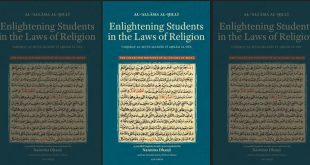The present book, volume 8 of 8, is dedicated to the issues of waqf, hajr and wasaya. How they occur, what are the rules, what invalidates them and so on, all presented from the viewpoints of the five Schools of thought.
‘Wuquf’ and ‘awqaf’ are the plurals of ‘waqf’ and its verb is ‘waqafa’, though ‘awqafa’ is also rarely used, as in al-Tadhkirah of al-Allamah al-Hilli. The word ‘waqf’ literally means ‘to detain’ and ‘to prevent’, as in ‘wuqiftu ‘an sayri’, i.e. ‘I was prevented from making my journey.’
In the context of the Shari’ah it implies a form of gift in which the corpus is detained and the usufruct is set free. The meaning of ‘detention’ of the corpus is its prevention from being inherited, sold, gifted, mortgaged, rented, lent, etc. As to dedication of the usufruct, it means its devotion to the purpose mentioned by the waqif (donor) without any pecuniary return.
Some legists consider waqf to be illegal in the Islamic Shari’ah and regard it as contradictory to its basic principles except where it concerns a mosque. But this view has been abandoned by all the schools of fiqh.
This work on the Shariah or Islamic Law offers a comparative study of the Divine Law that, according to authentic Islamic doctrines, embodies the Will of God in society. In the Islamic world view, God is the ultimate legislator. The five major schools that are used in the comparison are: Hanafi, Hanbali, Shafi’i, Maliki and Jaf’ari.
 Ijtihad Network Being Wise and Faithful Muslim in the Contemporary World
Ijtihad Network Being Wise and Faithful Muslim in the Contemporary World

